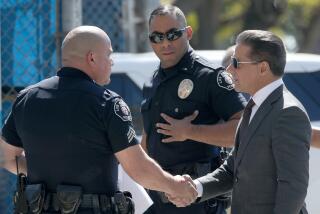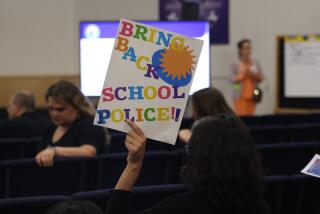School Cop Is in It for the Students
- Share via
“Pig” was a common jeer Mike Fuller heard his first week on duty as a campus cop at Century High School in Santa Ana. And this was an assignment he’d requested.
Two years later, the Santa Ana police officer’s school office walls are covered with pictures of students who now see him in a different light.
“Thanks for always being there,” one girl wrote on a prom picture she gave him. Another girl who sent a special thank-you picture had talked of suicide before Fuller became her mentor.
One smiling young man pictured with Fuller had faced expulsion for poor attendance, so Fuller picked him up every morning for months to drive him to school.
The Santa Ana Police Department has armed officers at all the city’s high schools. But the school force chief, Jim Mayashiro, singles out Fuller for highest praise.
Students and teachers alike credit Fuller with reducing tensions at Century, and improving attitudes.
“He’s visible, he’s there for the students,” said Nikki Tangeman, who teaches English language development. “He goes to their dances, their soccer games. He’s made a huge difference.”
Which is why Tangeman readily volunteered when Fuller needed faculty help with an idea he had: a law enforcement club on campus, something no other school had done.
It now has 15 students who have met Fuller’s strict standards for good grades and physical conditioning.
“It’s more like a mini-police academy,” Fuller says of his club. The students do drills and take police classroom training.
Lupe Rodgriguez, 17, a junior, laughs that she couldn’t do five push-ups when the club began; now she can do 55 with ease.
Maria Martinez, 16, also a junior, says she’s mostly gained from the club a better understanding of police work.
“Before, it was like, ‘Hey, we don’t like cops. They’re always harassing us.’ But now, I’ve learned that when a police officer asks you to step out of the car, it’s not to harass you, but to follow certain safety procedures.”
All of Fuller’s success was borne out of that first week on the job, when he faced the “pig” catcalls.
“I could have taken a structured line, let them know I was in charge,” said Fuller, 36, a 15-year police veteran. “But I took this job so I could work with students, not confront them. I just had to let them get to know me.”
So Fuller began wearing a pig pin on his lapel, to show he could take it. And slowly, he won most of them over. Not an easy chore when dealing with hardened gang members. But now, school officials say, gang students who scoffed at Fuller two years ago will come to him ahead of time to let him know if trouble is brewing.
Fuller had definite reasons for wanting the school post.
As a patrol officer dealing with young people, he explained, “you didn’t have time to sit down with them and find out why they did what they did. You’d have five calls stacked up and have to move on.”
But at Century, he said, he spends more time listening than standard policing. And he’s confirmed what he always believed: “Most kids who get in trouble just need someone to listen to them.”
Not that Fuller is completely sold on the idea of campus cops. It depends, he says, on the cop. “If they’re here to intimidate students, no, it doesn’t work. You have to care about these kids.”
Jerry Hicks’ column appears Monday and Thursday. Readers may reach Hicks by calling (714) 564-1049 or e-mail to jerry.hicks@latimes.com
More to Read
Sign up for Essential California
The most important California stories and recommendations in your inbox every morning.
You may occasionally receive promotional content from the Los Angeles Times.













